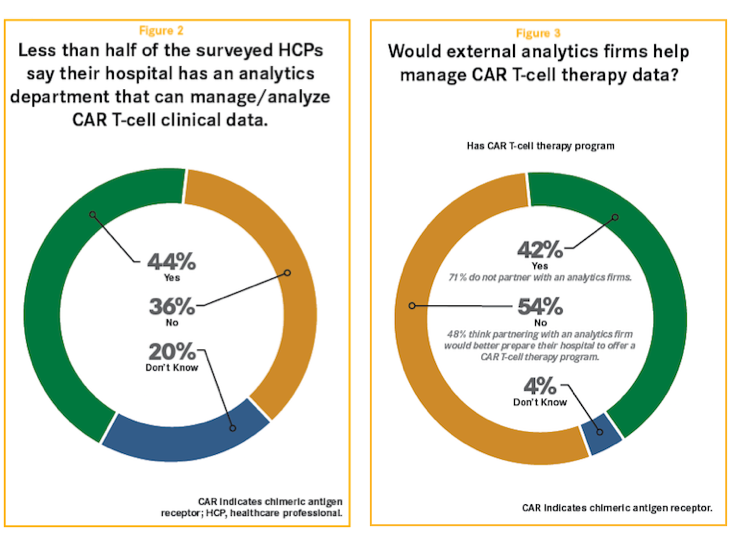Original Research: CAR T Needs Data, but Healthcare Is Not Ready
Original research suggests that clinicians want their organizations to better embrace tech surrounding the therapy.
Healthcare Analytics News™ is the official publication of Healthcare Research & Analytics® (HRA®), a healthcare market research practice with a particular focus on the hospital setting and specializations in managed markets, oncology, and pharmacy. As part of our partnership, we are able to publish exclusive research on key topics in the evolving field of health tech. This research appears in our April 2018 print issue.
Chimeric antigen receptor (CAR) T-cell therapy is a revolutionary form of immunotherapy, with recent successes in providing a potential second lease on life to young patients with cancer who otherwise would have faced limited options in their battle against the disease. The oncology space is abuzz with excitement, anticipation, and some level of uncertainty about how the therapy’s power will unfold.
CAR T-cell therapy involves the alteration of a patient’s innate immune cells to target and kill cancer cells. But it sometimes causes severe adverse effects, such as cytokine release syndrome, in which immune cells begin to attack normal, somatic cells. Given CAR T’s limited time on the market thus far, it is difficult to assimilate the long-term efficacy and adverse events associated with the treatment.
To help the pharmaceutical industry and cancer care institutions better prepare to offer CAR T-cell therapy safely and effectively, Healthcare Research & Analytics® (HRA®) recently conducted a syndicated study of the views of 75 healthcare professionals (HCPs) on their cancer care institution’s preparedness. About half of HCPs view data, analytics, and artificial intelligence (AI) tools as being very important to building a safe and effective CAR T-cell therapy program (Figure 1).
However, fewer of the surveyed HCPs believe their cancer care institution’s current electronic medical record (EMR) system is capable of managing all the data necessary to ensure the therapy goes well. Findings also indicate that many HCPs feel they do not have enough access to data and analytics to successfully manage the potential adverse effects a patient may experience. These results stress the importance of the role that data and analytics play in ensuring an institution is well prepared to offer patients the groundbreaking therapy.

Also of importance is who is responsible for managing and analyzing all the data collected from a CAR T-cell therapy program. Cancer care institutions can elect to conduct their data management and analytics either in house or outside, by forming a partnership with a dedicated data analytics firm. HRA®’s study found that less than half of HCPs said their hospital has an analytics/informatics department or team that is capable of managing and analyzing data from a CAR T-cell therapy program (Figure 2). What’s more, a majority of physicians in institutions that offer CAR T-cell therapy do not partner with an analytics firm to help manage data collected from patients receiving the therapy. However, of those HCPs whose hospital does not currently offer CAR-T cell therapy, about half believe that partnering with an analytics firm would help better prepare their hospital to offer the treatment (Figure 3).
With CAR T-cell therapy being the most significant driver in the oncology space, the role of data, analytics, and AI will be paramount to its long-term success.
To learn more about institutional areas of need and what the pharmaceutical industry can do to support preparedness for CAR T-cell therapy, view the HRA® webinar on CAR T-cell therapy by visiting hraresearch.com.
Podcast: Match Made in Hospitals — Patient-Matching Technology Can Improve Healthcare
September 21st 2021Clay Ritchey, CEO of Verato, highlights the administrative and financial benefits that patient-matching technology can provide hospitals and health systems, as well as how it can improve the patient experience.
Podcast: Using Digital Solutions to Address Technology Shortfalls with Citius Tech Senior VPs
July 29th 2021In an interview recorded earlier this year, Chief Healthcare Executive Associate Editorial Director Mary Caffrey spoke with 2 leaders of Citius Tech about meeting healthcare challenges with digital solutions.